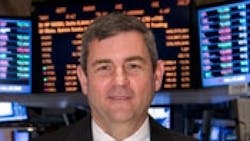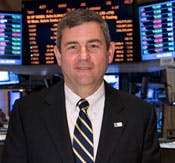Huntington Ingalls CEO Reflects on Life After Northrop Grumman
On March 29, Huntington Ingalls Industries Inc. CEO Mike Petters rang the closing bell at the New York Stock Exchange, marking the one-year anniversary of the shipbuilder's spinoff from Northrop Grumman Corp. (IW 500: 33).
Huntington Ingalls might be the oldest new publicly traded company on Wall Street.
The company's lineage goes back to 1886, when railroad baron Collis P. Huntington founded the Newport News Shipbuilding and Dry Dock Co.
Since then, the company -- which is the U.S. Navy's sole supplier of nuclear-powered aircraft carriers -- boasts that it has built more ships in more ship classes than any other U.S. naval shipbuilder.
In a two-part conversation with IndustryWeek, Petters -- a U.S. Naval Academy graduate and a 25-year veteran of the company -- reflects on Huntington Ingalls's first year as a standalone entity and talks about some of the challenges and opportunities on its horizon.
First Year
IW: As you look back on the company's first year after the spinoff, what's your assessment?
MP: When you become a public company, you do a lot of things for the very first time, and most of those fall into the area of [financial] reporting or investor relations, legal things -- things that your corporate parent was doing for you before that you now have to do.
And so you have to work your way through all those things, and you have to be pretty good at that from the beginning.
As far as all of the things that we had to do for the first time, we got all of those right. But the highlights of the year really go back to the things we've been doing for 125 years.
We delivered some ships last year that set some standards relative to quality and performance.
We delivered an LPD at the very end of the year -- the LPD-22 San Diego [a San Antonio-class amphibious transport dock] -- that is clearly the very best LPD we've ever delivered.
This is a program that we've had some challenges with. And so for our team to work their way through the process of delivery, not just to get to the finish line, but to get to the finish line in a high-quality, high-standard kind of way -- which now sets the path for how we will deliver the remaining ships in that class -- is a very important milestone for us.
The folks in Newport News delivered a submarine in the fall [the Virginia-class submarine California] substantially early to their contract, with great price performance and as operationally complete as any ship that's been delivered, and we're very proud of that.
And so for all of the things that we did right in our first year as a public company, what we really have going for us is that our business is going very, very well, and we've been focused on quality, on safety, and on driving the cost and schedule performance that we need to continue to improve our overall performance.
And for me that's not just satisfying, but it's also very exciting, because you start to see what the potential of the business can be down the road.
Delivering on Promises
IW: On March 28, Huntington Ingalls reported its full-year 2011 financial results. Revenue was down about 2% to $6.58 billion, while adjusted total operating margin was up from 3.7% in 2010 to 6.6% in 2011. What are the key takeaways from the company's first year of financial results?
MP: Well, to answer that, we need to go back to the day of our spinoff.
At that point, we were describing a business that has a pretty flat top line. Our margins are depressed a bit, because we are working through some fairly tough ship programs on the Gulf Coast.
We had five ships in the system that we needed to deliver. We got the first one out in December -- the San Diego -- and that was another part of why that was such a big deal for us. We have four to go [LPDs 23, 24, 25 and 26].
But the retirement of that risk, combined with the new business that we were signing up for, would allow us -- even with a flat top line -- to grow the margins of the business and generate more cash on the bottom line, between now and 2015. [Petters has pledged to investors that the company will widen its operating margin to 9% by 2015.]
So I think you get to the end of the year and you look back and say, 'You know, they kind of did what they said they were going to do.'
We delivered the ships that we said we were going to deliver. We generated the cash that we said we were going to generate. We achieved the margins that we said we were going to achieve.
And so from that standpoint, it was a very successful year. Nothing's changed this year.
We've got another challenging year ahead of us. We've got a couple of ships to deliver -- two of the four remaining ships deliver this year, and we launch the other two this year.
And 2013 is when we get all of that out of our system. We work our way through the path for Avondale, and we put all of that behind us. And that becomes an inflection point for the business.
And then you can see margin and cash expand between next year and 2015 to get back up to where the business normally is, which is margins in the 9-plus-percent range.
So we have a bottom-line growth story even though we're not growing on the top line, and I think we now have 12 months of doing what we said we were going to do.
Closing Bell
IW: You recently got to ring the closing bell at the New York Stock Exchange. What was that like for you?
MP: Working with the Navy and the Coast Guard, and being involved in ship christenings and comissionings and keel layings and all of the traditions that stretch way, way back, I'm always really, really honored to have a chance to represent shipbuilders at those kinds of things.
The New York Stock Exchange has its own set of history. And when you're there on the floor of the exchange or you're meeting with the folks there -- seeing how capital gets allocated, basically, on a minute-by-minute basis -- it's pretty impressive, and frankly pretty exciting.
And so it was a great day for the corporation, and a highlight.
IW: Was this your first time ringing the bell?
MP: We were on the floor of the exchange on our first day of trading last year, but we did not ring the bell that day. It was also the opening day of baseball season, and [Major League Baseball] and the Clydesdales were on the floor that morning, so they rang the bell.
Given the nature of the spinoff and the filings and all of that, we couldn't exactly precisely pin down the day that we were going to start trading until too late to reserve a spot. So we decided that since we couldn't be there on the first day, we would celebrate the first year, and that, I think, was actually pretty appropriate.
This is part one in a two-part conversation with Huntington Ingalls Industries President and CEO Mike Petters.
About the Author
Josh Cable
Former Senior Editor
Former Senior Editor Josh Cable covered innovation issues -- including trends and best practices in R&D, process improvement and product development. He also reported on the best practices of the most successful companies and executives in the world of transportation manufacturing, which encompasses the aerospace, automotive, rail and shipbuilding sectors.
Josh also led the IndustryWeek Manufacturing Hall of Fame, IW’s annual tribute to the most influential executives and thought leaders in U.S. manufacturing history.
Before joining IndustryWeek, Josh was the editor-in-chief of Penton Media’s Government Product News and Government Procurement. He also was an award-winning beat reporter for several small newspapers in Northeast Ohio.
Josh received his BFA in creative writing from Bowling Green University, and continued his professional development through course-work at Ohio University and Cuyahoga Community College.
A lifelong resident of the Buckeye State, Josh currently lives in the Tremont neighborhood of Cleveland. When the weather cooperates, you’ll find him riding his bike to work, exercising his green thumb in the backyard or playing ultimate Frisbee.

